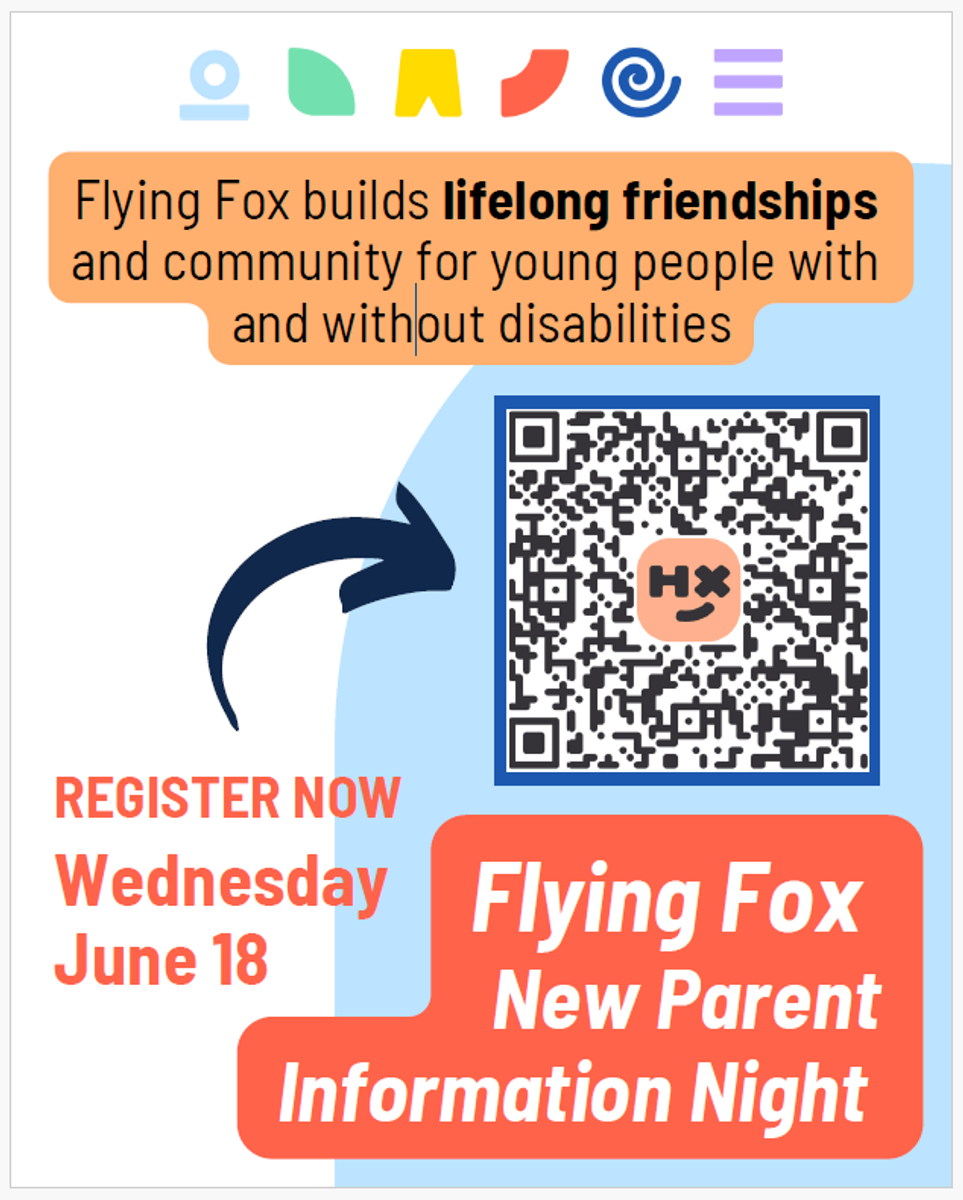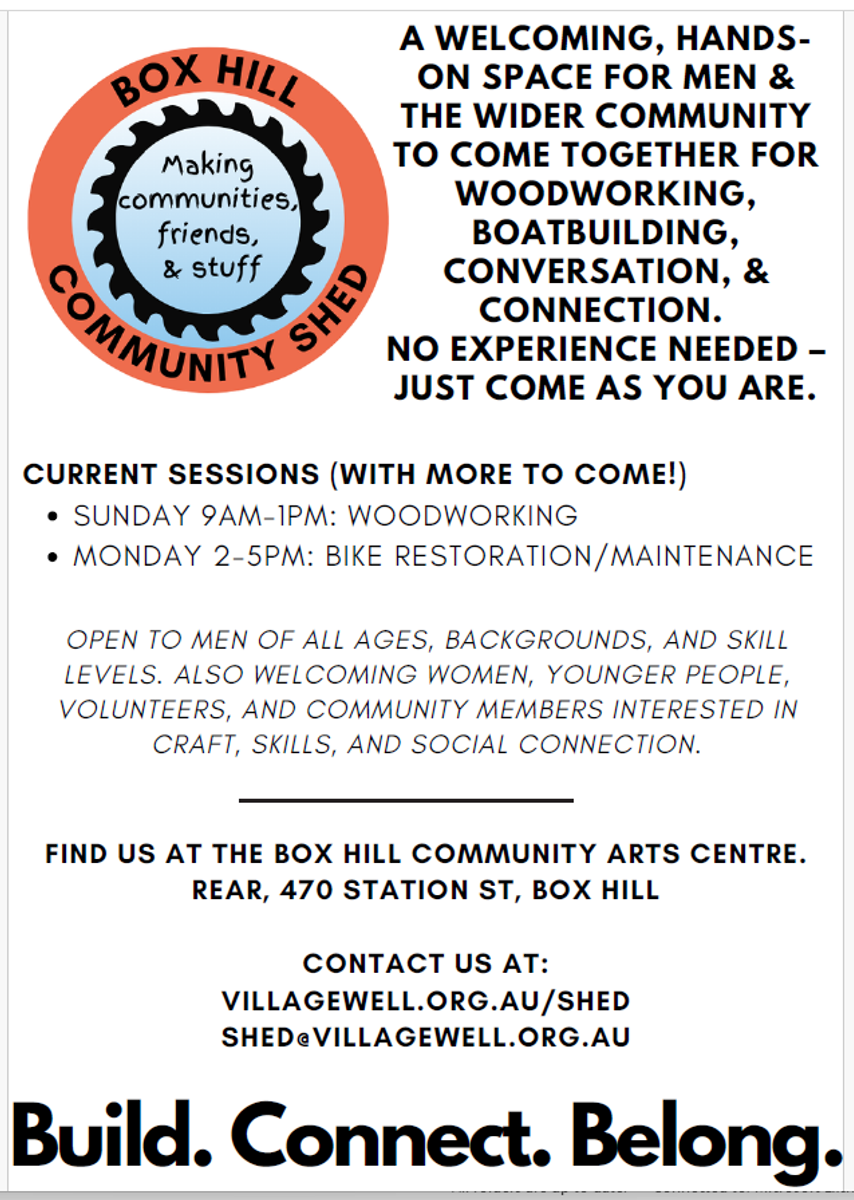Community notices

Flying Fox New Parent Information Night
Box Hill Community Shed
Box Hill Community Shed, a newly opened creative workshop space hosted at the Box Hill Community Arts Centre. Rooted in the Men’s Shed tradition, our Shed offers a welcoming space where people can come together to build, create, and connect. Importantly, we are also a Community Shed, open to men and women of all ages and cultural backgrounds.
We believe there may be students or family members in your school community who would benefit from engaging with the Shed — whether it's older relatives seeking connection, students with an interest in hands-on projects, or even staff looking for community-based engagement.
We are currently offering:
- Woodworking, bike restoration/maintenance, and boatbuilding projects
- Opportunities to volunteer, learn, or share skills
- A welcoming environment focused on community, wellbeing, and creativity
The Shed also provides cheap/free reconditioned bicycles and free bike maintenance on Mondays (2-5pm) which may be of value to your students.
If you would be willing to share our attached flyer in your parent newsletter or staff bulletin, or display it in a visible location, we would be most appreciative. And if there’s a possibility of exploring future collaborations or shared initiatives, we’d love to chat.
Please don’t hesitate to pass this on to the relevant person at your school, your PTA, or reach out to us directly:
Website: villagewell.org.au/shed
Email: shed@villagewell.org.au
Phone: 0481 350 251
Warm regards
Eddie ChapmanCoordinator, Box Hill Community Shed
An initiative of the Village Well Community Centre, and with the support of the Box Hill Baptist Church.
Spinal Health Week
“Give kids & parents the heads up on tech neck this National Spinal Health Week!”
National Spinal Health Week - 26 May - 1 June 2025 - A Community Health Initiative
The Australian Institute of Family Studies reports that Australian children spend more time on screens than is recommended. I’m writing to you to invite your support for National Spinal Health Week 2025 (26 May – 1 June 2025) to help increase awareness of the risks to students and parents of developing tech neck through misuse or overuse of technology devices.
This annual awareness initiative aims to shine a spotlight on spinal health issues affecting millions of Australians, including children and young people, and how educators can take proactive steps to improve the spinal health of our children.
An initiative of the Australian Chiropractors Association (ACA), Spinal Health Week is Australia’s leading and longest-running, award-winning community health awareness campaign for musculoskeletal health. For nearly 30 years, it has promoted the importance of maintaining spinal health and preventing musculoskeletal disorders (MSDs).
The 2025 focus is on preventing tech neck!
This year, Spinal Health Week targets preventing Tension Neck Syndrome - commonly known as ‘tech neck’ or ‘text neck’ which is now a global health concern. Tech neck is caused by poor posture and prolonged or incorrect use of digital devices, including smartphones, tablets and computers. Studies show neck pain now affects 1 in 5 Australians, with increasing prevalence among younger demographics, including children and teens, due to digital device overuse.
Studies have shown that incorrect or overuse of smartphones, tablets, computers and other electronic devices can cause tech neck when children and young people spend too much time with their head bent forward reading or scrolling electronic devices.
Educators, parents and students should adjust their thinking on tech use to help prevent tech neck!
The Australian Institute of Family Studies reports Australian children spend more time on screens than is recommended with research suggesting that between 77-83% of preschoolers, 75% of 5-12 year olds and 64% of 12-13 year olds exceed recommended daily screentime guidelines.
With 46% of Australian children aged 6-13 owning or having access to a mobile device and 75.5% of Australians aged 16 to 64 using computers daily, with almost 87% of Australians regularly using smartphones, the need to educate the community on tech neck prevention is more urgent than ever.
But tech neck isn’t limited to the use of mobile devices. Prolonged or incorrect use of computers can also lead to this growing spinal health concern so adults who regularly use computers, students, and everyday device users are all at risk from non-ergonomic setups and poor posture habits.
The most prevalent symptoms among smartphone users (neck and back pain) have been linked to the length of time spent using a device to the degree of pain experienced. According to the Australian Institute of Family Studies - August 2021 (AIFS), most Australian children spend more time on screens than is recommended including using e-games, digital tablets and smartphones while parents report that excessive screentime is the top health concern they have for their children.
- 17–23% of preschoolers and 15% of 5–12-year-olds meet screen-time guidelines.
- Screen time has been shown to increase between the ages of 10 and 14, especially among boys.
- The types of screen-time that increased was electronic gaming for boys and TV, computer use and social networking for girls.
The AIFS provides guidelines for parents to keep children active and minimise screen-time.
- 2 years and younger: no screen time
- 2-5 years: no more than one hour per day
- 5-17 years: no more than two hours of sedentary recreational screen time per day for children and young people (not including schoolwork).
Australians must rethink how we use digital devices and help educate children and younger people who often spend extended periods with their heads tilted forward while scrolling on smartphones and tablets.
With tech neck symptoms including chronic neck, shoulder and upper back pain, headaches, and postural issues, the impact on physical health, mental wellbeing and productivity at work, school and at home can be significant.
Over 6.1 million Australians are living with MSDs, including debilitating neck pain. That’s why we’re calling on community leaders and educators to join the Spinal Health Week movement and share practical strategies to help prevent tech neck, support spinal health, and reduce the future economic and personal burden of MSDs on families.




